The Flavour of SuchUkrLit
 Rapid growth of interest to the books written by modern Ukrainian authors, especially on the part of young readers, is hard to come unnoticed. And it is not only the interest in renowned masters of contemporary Ukrainian literature (or SuchUkrLit, as it’s often abbreviated) — Vasyl’ Shkljar, Yury Vynnychuk, Yevgenija Kononenko, Vasyl’ Kozheljanko, Leonid Kononovych, Halyna Pahutyak etc. This growing attention correlates to consistent (and recently even mass) entering of a new formation of authors into literary life. Thus — subsequent to Yury Andrukhovych, Oksana Zabuzhko, Taras Prokhasko, Yurko Izdryk, Serhiy Zhadan, Svitlana Povaljajeva, Ljubko Deresh, Irena Karpa, Maryna Mednikova, Maria Matios etc — the new generation has appeared: Halyna Lohinova, Maryna Sokolyan, Tanya Malyarchuk, Sofia Andrukhovych, Kseniya Kharchenko, Halyna Tkachuk, Tetjana Vynokurova-Sadychenko, Sashko Ushkalov etc.
Rapid growth of interest to the books written by modern Ukrainian authors, especially on the part of young readers, is hard to come unnoticed. And it is not only the interest in renowned masters of contemporary Ukrainian literature (or SuchUkrLit, as it’s often abbreviated) — Vasyl’ Shkljar, Yury Vynnychuk, Yevgenija Kononenko, Vasyl’ Kozheljanko, Leonid Kononovych, Halyna Pahutyak etc. This growing attention correlates to consistent (and recently even mass) entering of a new formation of authors into literary life. Thus — subsequent to Yury Andrukhovych, Oksana Zabuzhko, Taras Prokhasko, Yurko Izdryk, Serhiy Zhadan, Svitlana Povaljajeva, Ljubko Deresh, Irena Karpa, Maryna Mednikova, Maria Matios etc — the new generation has appeared: Halyna Lohinova, Maryna Sokolyan, Tanya Malyarchuk, Sofia Andrukhovych, Kseniya Kharchenko, Halyna Tkachuk, Tetjana Vynokurova-Sadychenko, Sashko Ushkalov etc.
Emergence of the whole new cohort of young authors makes those of the older formations keep to the standard. As a result, today we can detect a real writing boom and literature works capable of satisfying tastes of absolutely any reader.
1984 Phenomenon
 It was in the end of 2005 when we discovered a curious tendency: nearly every European country produced at least one teenage author whose first book has been written at age of 15-17 and has turned out to be a national bestseller. Examples are Benjamin Lebert (born 1982) in Germany, Irena Karpa (born 1980) and Sofia Andrukhovych (born 1982) in Ukraine and Dorota Maslowska (born 1983) in Poland. But especially «fruitful», both in Ukraine and in Europe, the year of birth 1984 turned out to be. We have called this the «1984 phenomenon». The trend is represented by Melissa Paranello (with her book One Hundred Touches (Melissa’s Diary)) in Italy, Anne-Sophie Brasme and her Breathe in France, Miroslaw Nahacz and his books and scripts in Poland, Ana Vickovic in Serbia, and Ljubko Deresh in Ukraine.
It was in the end of 2005 when we discovered a curious tendency: nearly every European country produced at least one teenage author whose first book has been written at age of 15-17 and has turned out to be a national bestseller. Examples are Benjamin Lebert (born 1982) in Germany, Irena Karpa (born 1980) and Sofia Andrukhovych (born 1982) in Ukraine and Dorota Maslowska (born 1983) in Poland. But especially «fruitful», both in Ukraine and in Europe, the year of birth 1984 turned out to be. We have called this the «1984 phenomenon». The trend is represented by Melissa Paranello (with her book One Hundred Touches (Melissa’s Diary)) in Italy, Anne-Sophie Brasme and her Breathe in France, Miroslaw Nahacz and his books and scripts in Poland, Ana Vickovic in Serbia, and Ljubko Deresh in Ukraine.
Thus, Anne-Sophie Brasme’s novel Breathe has been written when the author was 16. In France the book has been named the best debut of the year 2001. Breathe has become a national bestseller, with 18 companies struggling for the right to translate it to film.
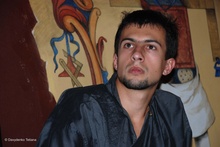 Ljubko Deresh has written his first novel Pokloninnya yaschirtsi (Worshiping the Lizard) when he was 15, the second novel Kult was written at the age of 18, and ARCHE at the age of 19. All three books have become Ukrainian bestsellers, there are the audiobooks recorded. Later two more Deresh’s books, Namir! (Aim!) and Trohy pitmy (A Bit of Darkness), have been published. Today his books have been printed or are to be printed in Germany, Poland, Italy, France, Romania, Bulgaria etc.
Ljubko Deresh has written his first novel Pokloninnya yaschirtsi (Worshiping the Lizard) when he was 15, the second novel Kult was written at the age of 18, and ARCHE at the age of 19. All three books have become Ukrainian bestsellers, there are the audiobooks recorded. Later two more Deresh’s books, Namir! (Aim!) and Trohy pitmy (A Bit of Darkness), have been published. Today his books have been printed or are to be printed in Germany, Poland, Italy, France, Romania, Bulgaria etc.
The world of adults is almost absolutely non-existent in the books written by the authors of the 1984 phenomenon. They represent a closed world of teenagers with characters shown in particular and often «extreme» conditions. It is due to being extremely provocative that these books have gained their popularity with both adults and adolescents.
The New Generation «16 to 26»
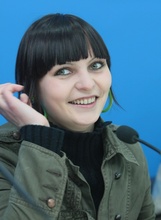 Nowadays in Ukraine a new tendency can be observed, apparently a unique one as we failed to discover something like this in other countries. A new, «other» generation of authors aged 16 to 26 has emerged. The authors of this generation have written their debut works at the age of 17-20, and the fair share of their books has been printed after 2005. Among them are Halyna Tkachuk (born 1985), Tetjana Vynokurova-Sadychenko and Kseniya Kharchenko (both born 1984), Tanya Malyarchuk and Sashko Ushkalov (born 1983), Halyna Lohinova, Maryna Sokolyan and Ljubomyra Knjazhych (born 1979) etc. And as life keeps going, a number of curios writers born in 1986-1987 have already appeared.
Nowadays in Ukraine a new tendency can be observed, apparently a unique one as we failed to discover something like this in other countries. A new, «other» generation of authors aged 16 to 26 has emerged. The authors of this generation have written their debut works at the age of 17-20, and the fair share of their books has been printed after 2005. Among them are Halyna Tkachuk (born 1985), Tetjana Vynokurova-Sadychenko and Kseniya Kharchenko (both born 1984), Tanya Malyarchuk and Sashko Ushkalov (born 1983), Halyna Lohinova, Maryna Sokolyan and Ljubomyra Knjazhych (born 1979) etc. And as life keeps going, a number of curios writers born in 1986-1987 have already appeared.
The «16 to 26» authors create a wholly new type of literature. Their books rarely feature violence, drink, drugs, foul language and other themes typical of the previous generation. They are so original and interesting that no provocation is needed anymore. And though these works are written by yesterday’s teenagers and often tell about adolescents or children, their reader is an adult person.
The «1984 phenomenon» generally represents the closed teenager’s world; the «16 to 26» generation is eager to interact with the «adult» world. A curious thing is that almost all authors of the new generation are girls.
One more peculiarity if this «other» generation is the fact that all these children grew up in one and the same era and in more or less similar conditions, but each one is a bright personality. What is more, every new book of one and the same author is different from the previous one.
The «16 to 26» generation’s writings have already attracted attention of foreign publishers. This is why we are convinced that these authors nowadays represent Ukraine’s national identity. For in civilized world it is not the state’s economic and military power or rudeness and ignorance of its politicians that determine its image, but its culture and, above all, its contemporary literature.
Post-catastrophe Prose
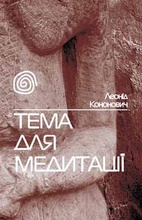 In 2004 Leonid Kononovych shocked the Ukrainian audience with his novel Tema dlya medytatsii (Theme for Meditation). Media had to invent a new term to determine the genre of this novel, as nothing of the like has ever appeared in Ukrainian literature before. Thus the term ‘post-catastrophe prose’ has been coined by Mykola Skyba. The novel has received positive press and stirred up sharp discussions concerning not only the novel as such but also who writes about it and what. Tema dlya medytatsii has also become a theme for endless discussion on Internet forums. E-source sumno.com, popular among teenagers and post-teens, listed Tema dlya medytatsii number one among must-reads for two years, though no other book has ever «survived» more than two months.
In 2004 Leonid Kononovych shocked the Ukrainian audience with his novel Tema dlya medytatsii (Theme for Meditation). Media had to invent a new term to determine the genre of this novel, as nothing of the like has ever appeared in Ukrainian literature before. Thus the term ‘post-catastrophe prose’ has been coined by Mykola Skyba. The novel has received positive press and stirred up sharp discussions concerning not only the novel as such but also who writes about it and what. Tema dlya medytatsii has also become a theme for endless discussion on Internet forums. E-source sumno.com, popular among teenagers and post-teens, listed Tema dlya medytatsii number one among must-reads for two years, though no other book has ever «survived» more than two months.
«With this review I intend to break our sight’s standards of writing mini-reviews. Leonid Kononovych’s book has changed my worldview, if not broken it at all… This book made me really share the main character’s experience; I experienced what he did, as it is an incredible piece of writing. None of the like have I ever met before neither in contemporary literature nor in what is called classics. It is an unreal novel telling of real events and written by a real person…» (Bohdan Logvynenko, head editor of sumno.com)
«Tema dlya medytatsii» has proved that writing without dressing-off or special effects is possible, it only costs burned nerves and strenuous mental effort… To my mind, it is one of the first epics in the whole Ukrainian literature as such.» (Vasyl’ Herasym’yuk)
Provocative Prose
A special genre of contemporary Ukrainian literature is constituted by harsh provocative texts by authors like Yurko Izdryk, Serhiy Zhadan, Svitlana Povaljajeva, Irena Karpa etc. Such texts are an integral part within the literature of any modern country. Such books generally tell about life of marginal and subcultural characters, and can make a decent contribution to the collection of someone loving Burroughs’s and Kerouac’s «psychedelic fiction», or its modern followers — Irvine Welsh or Chuck Palahniuk.
To this genre belong, to a certain extent, early novels by Yury Andrukhovych and Ljubko Deresh’s ARCHE.
Psychological Short Stories
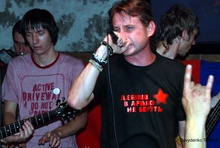 The genre of short prose (including short stories, novelettes and micro-novels) has always been traditionally potent in contemporary Ukrainian literature. Here we in any case should mention V’yacheslav Medvid’s micro-novel Lyokh (The Cellar), Yevgenija Kononenko’s short stories (collections Bez muzhyka (No Man’s Woman), Novely dlya nezilovanykh divchat (Stories for Unkissed Girls), and Poviyi tezh vykhodyat zamizh (Prostitutes Marry Too), Maria Matios’s short stories and novellas (Nation and Moskalytsya), Oksana Zabuzhko’s and Tanya Malyarchuk’s collections of short stories, Taras Prokhasko’s Leksykon tayemnykh znan (Lexicon of Secretive Knowledge) and Z tsyoho mozhna bulo b zrobyty kilka opovidan (There Could Be Made a Couple of Stories from This), Vasyl’ Kozheljanko’s Lohyka rechey (Logic of Things), Natalka Zabramska’s Zavzhdy (Always), Leonid Kononovych’s Povernennya (Return), Vasyl’ Portyak’s U snihakh (In the Snows) etc.
The genre of short prose (including short stories, novelettes and micro-novels) has always been traditionally potent in contemporary Ukrainian literature. Here we in any case should mention V’yacheslav Medvid’s micro-novel Lyokh (The Cellar), Yevgenija Kononenko’s short stories (collections Bez muzhyka (No Man’s Woman), Novely dlya nezilovanykh divchat (Stories for Unkissed Girls), and Poviyi tezh vykhodyat zamizh (Prostitutes Marry Too), Maria Matios’s short stories and novellas (Nation and Moskalytsya), Oksana Zabuzhko’s and Tanya Malyarchuk’s collections of short stories, Taras Prokhasko’s Leksykon tayemnykh znan (Lexicon of Secretive Knowledge) and Z tsyoho mozhna bulo b zrobyty kilka opovidan (There Could Be Made a Couple of Stories from This), Vasyl’ Kozheljanko’s Lohyka rechey (Logic of Things), Natalka Zabramska’s Zavzhdy (Always), Leonid Kononovych’s Povernennya (Return), Vasyl’ Portyak’s U snihakh (In the Snows) etc.
 Vasyl’ Stefanyk, who lived and wrote in the first half of the 20th century, has set a good tradition and is still, from our point of view, one of the most up-to-date Ukrainian writers. Understanding short prose by V’yacheslav Medvid, Taras Prokhasko and Leonid Kononovych requires certain background; but other authors’ books are aimed at the broad spectrum of readers.
Vasyl’ Stefanyk, who lived and wrote in the first half of the 20th century, has set a good tradition and is still, from our point of view, one of the most up-to-date Ukrainian writers. Understanding short prose by V’yacheslav Medvid, Taras Prokhasko and Leonid Kononovych requires certain background; but other authors’ books are aimed at the broad spectrum of readers.
Peculiar of contemporary Ukrainian literature is the fact that psychological prose ranges from lesser forms to novellas and novels (some novels by Maria Matios, Anna Khoma, Iren Rozdobud’ko etc.)
Mystic Adventures
The seeds that Gogol and Bulgakov sowed into this soil have cropped well in the modern Ukraine. Mystic elements are deep-rooted in various SuchUkrLit’s books, starting with purely mystic or mystery detective stories and finishing with costume drama and adventure stories, or sometimes even works that hit the highlight class.
However, Ukrainian mystic adventures do not have much in common with Hollywood plots of feature horror movies or European pseudo-historical thrillers.
 Ukrainian mystic adventures are generally set not in some imaginary worlds, but right in the midst of familiar modern or historical realities. They range from adventures of a 17th century of wandering Orthodox deacon who wrote now popular folk song about «A gnat that married a fly» — Sribne moloko (Silver Milk) by Vasyl’ Shevchuk; a guardsman Tur from Serhiy Baturyn’s Okhoronetz (The Guard) (set in the 10th century Kyiv); a vampire’s servants from Halyna Pahutyak’s Sluha z Dobromylya (The Servant from Dobromyl) (12th-20th centuries); a kind of «Ukrainian Zorro» from Volodymyr Lys’s Maska (The Masque) (18th century); and a witchcraft practicing granny in Leonid Kononovych’s Tema dlya medytatsii to those of characters from Vasyl Shkljar’s Krov kazhana (Bat’s Blood) and Vasyl’ Kozheljanko’s retro-story Sribniy pavuk (Silver spider) (middle of 20th century).
Ukrainian mystic adventures are generally set not in some imaginary worlds, but right in the midst of familiar modern or historical realities. They range from adventures of a 17th century of wandering Orthodox deacon who wrote now popular folk song about «A gnat that married a fly» — Sribne moloko (Silver Milk) by Vasyl’ Shevchuk; a guardsman Tur from Serhiy Baturyn’s Okhoronetz (The Guard) (set in the 10th century Kyiv); a vampire’s servants from Halyna Pahutyak’s Sluha z Dobromylya (The Servant from Dobromyl) (12th-20th centuries); a kind of «Ukrainian Zorro» from Volodymyr Lys’s Maska (The Masque) (18th century); and a witchcraft practicing granny in Leonid Kononovych’s Tema dlya medytatsii to those of characters from Vasyl Shkljar’s Krov kazhana (Bat’s Blood) and Vasyl’ Kozheljanko’s retro-story Sribniy pavuk (Silver spider) (middle of 20th century).
And even Maryna Sokolyan’s purely mystical novels Kodlo (The Mob), Cherem and Kovdra snovydy (Sleepwalker’s Blanket), Tetjana Vynokurova-Sadychenko’sZhart druhyi. Kvit paporoti (The Joke Number Two. Fern-Blossom) or Alla Serova’s Inshiy vyd (Another Species) are based on historical facts, legends of myths.
Alternative History
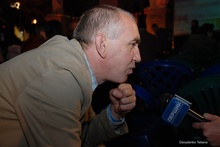 Vasyl’ Kozheljanko — the most prominent Ukrainian author among those who wrote in the genre of alternative history — died at the age of 51 in August of 2008. He was dubbed the father of a subgenre known as «Ukrainian alternative history», or «political fantasy». He wrote seven novels belonging to this kind. The most well-known are Defiliada v Moskvi (Military Parade in Moscow), Konotop and Terrorium. The latter, written in 2001, is an astonishing prophecy of the Orange Revolution and its results.
Vasyl’ Kozheljanko — the most prominent Ukrainian author among those who wrote in the genre of alternative history — died at the age of 51 in August of 2008. He was dubbed the father of a subgenre known as «Ukrainian alternative history», or «political fantasy». He wrote seven novels belonging to this kind. The most well-known are Defiliada v Moskvi (Military Parade in Moscow), Konotop and Terrorium. The latter, written in 2001, is an astonishing prophecy of the Orange Revolution and its results.
Another author who has tried his hand in the genre of alternative history is Oleksandr Irvanets with his phantasmagorical novels Rivne/Rovno and Ochamymrya.
Crime, Action and Sob Novel
 The following words of Alla Syerova may become the Ukrainian crime novel motto: «Everyone has something to hate distractedly». It is in the first place women who read such stories, and there are many women who write them. The best examples of the genre in contemporary Ukrainian literature are Vasyl’ Shkljar’s Klyuch (The Key); Alla Sjerova’s Pravyla hry (Rules of the Game), Podviyne dno (False Bottom), and Zabraty tyhrenya (Taking Away the Tiger Cub); Yevgenija Kononenko’s Imitatsia (Imitation) and Betrayal. ZRADA made in Ukraine; Maryna Mednikova’s Zirka, abo Terorystka (The Star, or Terrorist) and Krutaya plus, abo Terorystka-2 (Die-Hard Extra, or Terrorist-2); Anna Khoma’s Repetytor (The Tutor) etc.
The following words of Alla Syerova may become the Ukrainian crime novel motto: «Everyone has something to hate distractedly». It is in the first place women who read such stories, and there are many women who write them. The best examples of the genre in contemporary Ukrainian literature are Vasyl’ Shkljar’s Klyuch (The Key); Alla Sjerova’s Pravyla hry (Rules of the Game), Podviyne dno (False Bottom), and Zabraty tyhrenya (Taking Away the Tiger Cub); Yevgenija Kononenko’s Imitatsia (Imitation) and Betrayal. ZRADA made in Ukraine; Maryna Mednikova’s Zirka, abo Terorystka (The Star, or Terrorist) and Krutaya plus, abo Terorystka-2 (Die-Hard Extra, or Terrorist-2); Anna Khoma’s Repetytor (The Tutor) etc.
Unlike other genres, quality action novel didn’t appear in Ukrainian literature until the mid-1990s. Leonid Kononovych’s ironic crime novel Ya, zombi (I, Zombie) published in the Suchasnist magazine, has become the first portent. Kononovych has written some dozen novels of the same genre, the most interesting being Kaydany dlya oligarkha (Shackles for a Tycoon) and Feministka (The Feminist).
Kononovych’s novels are examples of «macho» fiction; but Vasyl’ Shkljar’s action novel Elemental is quite popular among the stronger part of the ‘weaker’ sex.
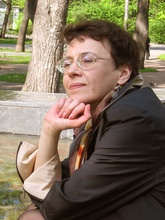 As in every country, so-called «women’s prose» is also popular in Ukraine with both authors and readers. Here we should first of all mention Oksana Zabuzhko and her novel Polyovi doslidjenya z ukrainskoho seksu (Field Work in Ukrainian Sex); Iren Rozdobud’ko with her novels Gudzik (A Button), Dvanatsyat, abo vykhovannya zhinky v umovakh, neprydatnykh dlya zhytya (Twelve, or Educating a Woman in Unlivable Conditions), Ziv’yali kvity vykydayut (Faded Flowers are Thrown Away) etc; Larysa Denysenko with her novels Zabavky z ploti ta krovi (Toys Made of Flesh and Blood), Kavovy prysmak korytsi (Cinnamon’s Coffee Taste), Tantsi v maskakh (Dancing Masked) etc; Hanna Medvid’ and her novels Magda, batkova dochka (Magda, Her Father’s Dauther), Kolir ochey (Colour of Eyes) and Sontse Schastya (Sun of Happiness) etc.
As in every country, so-called «women’s prose» is also popular in Ukraine with both authors and readers. Here we should first of all mention Oksana Zabuzhko and her novel Polyovi doslidjenya z ukrainskoho seksu (Field Work in Ukrainian Sex); Iren Rozdobud’ko with her novels Gudzik (A Button), Dvanatsyat, abo vykhovannya zhinky v umovakh, neprydatnykh dlya zhytya (Twelve, or Educating a Woman in Unlivable Conditions), Ziv’yali kvity vykydayut (Faded Flowers are Thrown Away) etc; Larysa Denysenko with her novels Zabavky z ploti ta krovi (Toys Made of Flesh and Blood), Kavovy prysmak korytsi (Cinnamon’s Coffee Taste), Tantsi v maskakh (Dancing Masked) etc; Hanna Medvid’ and her novels Magda, batkova dochka (Magda, Her Father’s Dauther), Kolir ochey (Colour of Eyes) and Sontse Schastya (Sun of Happiness) etc.
Horror and Thriller
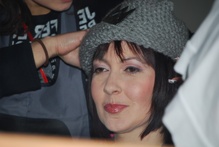 The horror genre in contemporary Ukrainian literature has just recently started, but there are already authors who set their horror plots in totally fictional worlds, in their characters’ dreams, and in real life circumstances. Pioneers of modern Ukrainian horror literature are Natalka and Oleksandr Shevchenko with their novels Brantsi moroku (Captives of the Gloom), Oksamytovy pereverten (Velvet Werewolf) and Kryvava osin u misti Leva (Bloody Autumn in the City of Lion). A new name appeared recently in Ukrainian horror literature — it’s Serhiy Loboda who has written novels Schizophrenia, Viddzerkalenya (Reflection) and a number of short stories published as a collection Trapeza (The Meal).
The horror genre in contemporary Ukrainian literature has just recently started, but there are already authors who set their horror plots in totally fictional worlds, in their characters’ dreams, and in real life circumstances. Pioneers of modern Ukrainian horror literature are Natalka and Oleksandr Shevchenko with their novels Brantsi moroku (Captives of the Gloom), Oksamytovy pereverten (Velvet Werewolf) and Kryvava osin u misti Leva (Bloody Autumn in the City of Lion). A new name appeared recently in Ukrainian horror literature — it’s Serhiy Loboda who has written novels Schizophrenia, Viddzerkalenya (Reflection) and a number of short stories published as a collection Trapeza (The Meal).
 In fact, there are hardly any Ukrainian writers completely specializing in thrillers. However, various authors write thriller novels and stories from time to time. Thus, now known as a women’s and children’s fiction books author Iren Rozdobud’ko formerly had her debut in literature as writer of horror thrillers Mertsi (The Dead) and Eskort u smert (Escort into Death). Ljubko Deresh’s novel Pokloninnya yaschirzi (Worshiping the Lizard) is a thriller, as are Andriy Kokotjukha’s Neitralna terytoria (Neutral Territory) and Povze zmiya (A Snake is Crawling).
In fact, there are hardly any Ukrainian writers completely specializing in thrillers. However, various authors write thriller novels and stories from time to time. Thus, now known as a women’s and children’s fiction books author Iren Rozdobud’ko formerly had her debut in literature as writer of horror thrillers Mertsi (The Dead) and Eskort u smert (Escort into Death). Ljubko Deresh’s novel Pokloninnya yaschirzi (Worshiping the Lizard) is a thriller, as are Andriy Kokotjukha’s Neitralna terytoria (Neutral Territory) and Povze zmiya (A Snake is Crawling).
Instead of Conclusion
Certainly, the range of SuchUkrLit described above can by no means be considered complete because to a great extent it’s subjective. It is impossible to imagine contemporary Ukrainian literature without V’yacheslav Medvid’s refined prose Lyokh (The Cellar), Krov po solomi (Blood on the Straw) etc, Kost’ Moskalets’s essays Kelia chainoyi troyandy (Cell of a China Rose) and Lyudyna na kryzhyni (Man on an Ice-floe), Yury Vynnychuk’s brilliant provocative erotic stories Divy nochi (Maidens of the Night), Vesnyani ihry v osinnikh sadakh (Vernal Plays in the Gardens of Autumn) etc, Bohdan Zholdak writing in «surzhik» dialect Boh buvaye (God Happens), Topinambur Synu (Girasol for the Son), Antiklamaks etc, Oles Ulyanenko’s «seamy side» masterful stories Stalinka, Dofin Satany (Satan’s Heir) etc and many others.
We deliberately avoid any evaluating, and this «classification» is rather relative, since our review is intended solely to help in choosing a book to your liking.
Publication arranged with MSBrand Corporation Agency

